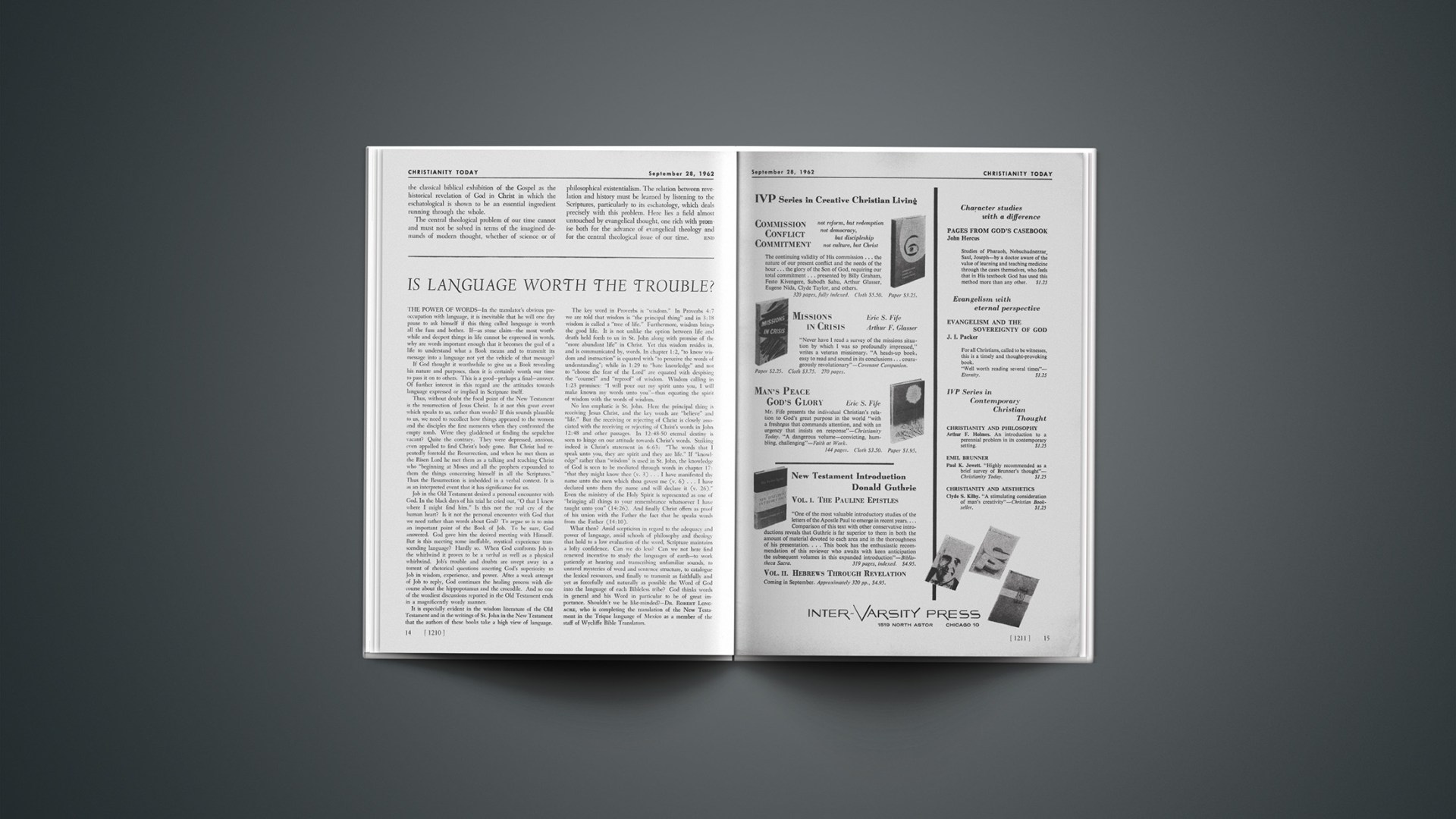The power of words—In the translator’s obvious preoccupation with language, it is inevitable that he will one day pause to ask himself if this thing called language is worth all the fuss and bother. If—as some claim—the most worthwhile and deepest things in life cannot be expressed in words, why are words important enough that it becomes the goal of a life to understand what a Book means and to transmit its message into a language not yet the vehicle of that message?
If God thought it worthwhile to give us a Book revealing his nature and purposes, then it is certainly worth our time to pass it on to others. This is a good—perhaps a final—answer. Of further interest in this regard are the attitudes towards language expressed or implied in Scripture itself.
Thus, without doubt the focal point of the New Testament is the resurrection of Jesus Christ. Is it not this great event which speaks to us, rather than words? If this sounds plausible to us, we need to recollect how things appeared to the women and the disciples the first moments when they confronted the empty tomb. Were they gladdened at finding the sepulchre vacant? Quite the contrary. They were depressed, anxious, even appalled to find Christ’s body gone. But Christ had repeatedly foretold the Resurrection, and when he met them as the Risen Lord he met them as a talking and teaching Christ who “beginning at Moses and all the prophets expounded to them the things concerning himself in all the Scriptures.” Thus the Resurrection is imbedded in a verbal context. It is as an interpreted event that it has significance for us.
Job in the Old Testament desired a personal encounter with God. In the black days of his trial he cried out, “O that I knew where I might find him.” Is this not the real cry of the human heart? Is it not the personal encounter with God that we need rather than words about God? To argue so is to miss an important point of the Book of Job. To be sure, God answered. God gave him the desired meeting with Himself. But is this meeting some ineffable, mystical experience transcending language? Hardly so. When God confronts Job in the whirlwind it proves to be a verbal as well as a physical whirlwind. Job’s trouble and doubts are swept away in a torrent of rhetorical questions asserting God’s superiority to Job in wisdom, experience, and power. After a weak attempt of Job to reply, God continues the healing process with discourse about the hippopotamus and the crocodile. And so one of the wordiest discussions reported in the Old Testament ends in a magnificently wordy manner.
It is especially evident in the wisdom literature of the Old Testament and in the writings of St. John in the New Testament that the authors of these books take a high view of language.
The key word in Proverbs is “wisdom.” In Proverbs 4:7 we are told that wisdom is “the principal thing” and in 3:18 wisdom is called a “tree of life.” Furthermore, wisdom brings the good life. It is not unlike the option between life and death held forth to us in St. John along with promise of the “more abundant life” in Christ. Yet this wisdom resides in, and is communicated by, words. In chapter 1:2, “to know wisdom and instruction” is equated with “to perceive the words of understanding”; while in 1:29 to “hate knowledge” and not to “choose the fear of the Lord” are equated with despising the “counsel” and “reproof” of wisdom. Wisdom calling in 1:23 promises: “I will pour out my spirit unto you, I will make known my words unto you”—thus equating the spirit of wisdom with the words of wisdom.
No less emphatic is St. John. Here the principal thing is receiving Jesus Christ, and the key words are “believe” and “life.” But the receiving or rejecting of Christ is closely associated with the receiving or rejecting of Christ’s words in John 12:48 and other passages. In 12:48–50 eternal destiny is seen to hinge on our attitude towards Christ’s words. Striking indeed is Christ’s statement in 6:63: “The words that I speak unto you, they are spirit and they are life.” If “knowledge” rather than “wisdom” is used in St. John, the knowledge of God is seen to be mediated through words in chapter 17: “that they might know thee (v. 3) … I have manifested thy name unto the men which thou gavest me (v. 6) … I have declared unto them thy name and will declare it (v. 26).” Even the ministry of the Holy Spirit is represented as one of “bringing all things to your remembrance whatsoever I have taught unto you” (14:26). And finally Christ offers as proof of his union with the Father the fact that he speaks words from the Father (14:10).
What then? Amid scepticism in regard to the adequacy and power of language, amid schools of philosophy and theology that hold to a low evaluation of the word, Scripture maintains a lofty confidence. Can we do less? Can we not here find renewed incentive to study the languages of earth—to work patiently at hearing and transcribing unfamiliar sounds, to unravel mysteries of word and sentence structure, to catalogue the lexical resources, and finally to transmit as faithfully and yet as forcefully and naturally as possible the Word of God into the language of each Bibleless tribe? God thinks words in general and his Word in particular to be of great importance. Shouldn’t we be like-minded?—DR. ROBERT LONGACRE, who is completing the translation of the New Testament in the Trique language of Mexico as a member of the staff of Wycliffe Bible Translators.










